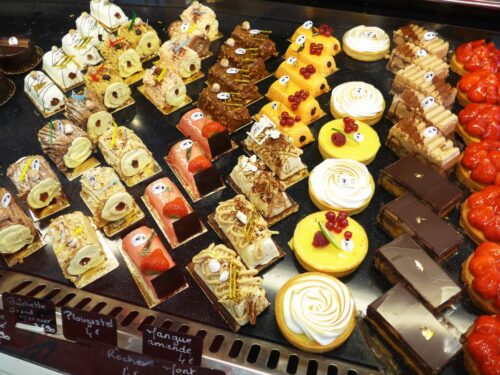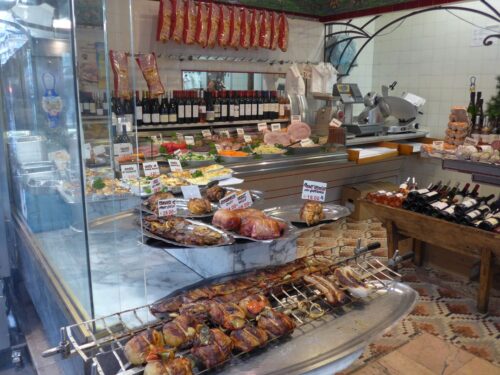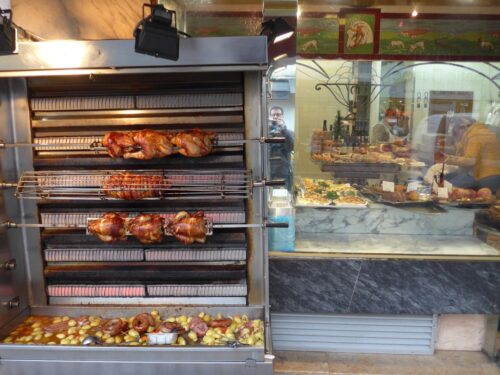Here are a couple of items that should shed some light on things that actual French people like and don’t like, or do and don’t do, and despite the endless flow of “insider’s” guidebooks, I’ve never seen them explained in English. (Did you know that you can’t order pastries in restaurants in France, for all intents and purposes?) This post was inspired by a friend who asked for some travel tips for a part of France that I hadn’t been to. It occured to me though that these tips should save every traveler time and headaches and I think they’re fascinating even if you’re not making a trip.
traiteur – a sort of deli that sells prepared foods to go and maybe sliced cheeses and meats (but not sandwiches! , which are sold at boulangeries, bakeries)….
To-go food is uncommon in Europe because most people think it’s unpleasant and barbaric to eat on the go, although this is rapidly changing. Some traiteurs will have rotisserie chickens and hot roasted meats, which used to come from separate establishments called rotisseries but the distinction is blurring. Sadly, traiteurs are nearly extinct, in Paris at least, and if you’re there for a week or two it’s unlikely you’ll simply stumble across one, so ask around because they can make your life easier. Guess what, Google is unable find many of them and will often send you to pastry shops and craft breweries because the algorithm sees hordes flocking to them and decides that must be what you want.
salon de thé – a pastry shop that is also a café, literally “tea room”. They’re very uncommon and I mention them only because they’re one of the few places where you can sit down and order any of those beautiful French pastries, which normally are only sold at pastry shops (pâtisseries) to take home and not available at cafés or restaurants. Exceptions include croissants and a few related basic breakfast items that you can get at normal cafés such as pain au raisin and pain au chocolat.; and expensive haute cuisine restaurants may have exquisite desserts that could be called pastries. Otherwise you may be able to find the fancy pastries in museum cafés and the occasional newer self-service tourist- or hipster-oriented café. You could waste half a day looking for these so you’re better off just getting the pastries to go from a pâtisserie. I believe salons de thé are seen as a little fusty and tired,, or at least old-lady-ish by the French for some unknown reason. There might be a few high-end ones for extremely rich women. Desserts in normal restaurants are not pastries but rather things like crème caramel, chocolate mousse, ice cream, and the apple tart called tarte tatin which you and I know is a pastry but for more unknown reason is available in restaurants.

insolite – “delightfully quirky”. As I’ve written elsewhere, insolite seems to be just about France’s favorite word for describing any object or place, tangible or intangible – anything you can experience, look at, buy or eat. I get a kick out of it because I do like things that are fresh and original and it’s interesting to see how they’ve come up with a word that sums it up. If you’ve ever seen the Australian TV show Kath and Kim where they call things “unusual” – that’s exactly what insolite is.
coup de cœur – “special favorite”, literally,”heart-stopper”. France’s other favorite word and I can pretty much guarantee every travel guidebook, brochure or website in French will have a list of coups de cœur. I guess our nearest equivalent would be “our picks” or “top 10” except coup de cœur implies not necessarily the top greatest things, but things with a special personal appeal. As I said before it wouldn’t surprise me if the website of the tax authorities reads “Come discover our coups de cœur for calculating your insolite mortgage interest tax deduction! ”
French rudeness is a myth – I don’t know if the French were ever especially rude but they aren’t now. French cities are crowded, fast-moving and loud which could come across as rudeness when you don’t know the language. It’s true, museum guards and security people are like New York subway booth employees but they hardly constitute a major segment of the population. Two tips. (1) France still has etiquette and behaviors that Americans might consider formal. Say “bonjour monsieur” and “bonjour madame” reflexively when you go in places. (2) Waiters, mostly those over 40 and/or in any restaurant more than twenty years old or so are considered professionals who deserve respect for performing a complicated and prestigious job. They’re not going to act like your friend any more than a judge would.

